《演讲的艺术1》
演讲的艺术
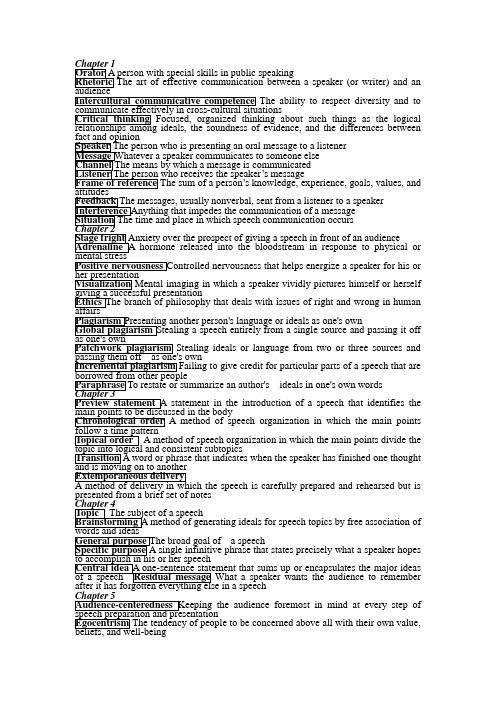
The art of effective communication between a speaker (or writer) and anThe ability to respect diversity and toFocused, organized thinking about such things as the logicalideals, the soundness of evidence, and the differences between’s messageThe sum of a person’s knowledge, experience, goals, values, andhormone released into the bloodstream in response to physical orMental imaging in which a speaker vividly pictures himself or herselfStealing ideals or language from two or three sources andFailing to give credit for particular parts of a speech that areTo restate or summarize an author's ideals in one's own wordsstatement in the introduction of a speech that identifies theA method of speech organization in which the main pointsA method of speech organization in which the main points divide theA word or phrase that indicates when the speaker has finished one thoughtpresented from a brief set of notesa speechWhat a speaker wants the audience to rememberthe audience foremost in mind at every step ofThe tendency of people to be concerned above all with their own value,Audience characteristics such as age, gender, education,Questions that require responses at fixed intervals along a scale ofthat allow respondents to answer however theymaterials used to support a speaker's ideas. The threeA story, narrative, or anecdote developed at some length toa speech together in a particular way to achieve aThe major points developed in the body of a speech. Most speechesmethod of speech organization in which the main pointsmethod of speech organization in which the main points follow amethod of speech organization in which the first mainof a problem and the second main point presents aA method of speech organization in which the main points divide theA word or phrase that indicates when a speaker has finished one thoughtstatement in the body of the speech that summarizes theA very brief statement that indicates where a speaker is in the speech or thatA question that the audience answers mentally rather than outstatement in the introduction of a speech that identifies the课后练习Chapter 4Topic :Studying abroadGeneral Purpose:To persuadeSpecific Purpose:To persuade the audience to study abroad will enhance your personal development,academic development,and career development.Central Idea:Main points: I. You should study abroad because it will enhance your personal development.II. You should study abroad because it will enhance your academic developmentIII. You should study abroad because it will enhance your career development.Topic : Events in triathlonGeneral purpose: To informSpecific purpose: To inform the audience of the three events in triathlon : swimming, cycling and running.Central Idea:Main points:The first event in triathlon is swimmingThe second event in triathlon is cycling.The third event in triathlon is running.I. The first major cause of airplane crashes is pilot error.II. The second major cause of airplane crashes is weather. Topical OrderIII. The third major cause of airplane crashes is mechanical failure.I. The peak of Mount Kilimanjaro has an arctic climate with snow,ice,,and violent winds.II. The middle of Mount Kilimanjaro has a rain forest climate with lush vegetation and diverse animal species.III. The base of Mount Kilimanjaro has a bushland climate with pastures and farming communities. Spatial OrderI. The Chinese film industry began in the early 20th century.II. The first golden period of Chinese cinema occurred during the 1930s.III. The second golden period occurred in the years after World War II.IV. The Chinese film industry was scaled back during the 1960s and 1970s.V. Today Chinese films are in another golden period of international acclaim.Chronological Order。
演讲的艺术

读书笔记模板
01 思维导图
03 目录分析 05 精彩摘录
目录
02 内容摘要 04 读书笔记 06 作者介绍
思维导图
关键字分析思维导图
极其重要
生活
结构
第章
演讲词
艺术
应变
艺术
舞台
世纪 技巧
语言
方式
演讲
开头
选材
说服力
临场
安排
内容摘要
本书告诫年轻人,比事业成功更重要的是首先要学会生活,也就是说,为自己寻找最佳的生活方式极其重要。 新的世纪为我们提供了广阔的舞台,也为人们提供了更多的施展自己才能的机会,值得人们去努力奋斗、积极进 取,也足以使那些不思进取、裹足不前的人振奋精神,去获取辉煌的成功!
0 4
第9章慷慨 激昂:演讲 鼓动人心的 技巧
0 6
第11章临 场应变:控 制现场气氛 的技巧
0 5
第10章语 言修辞:强 化演讲艺术 的技巧
读书笔记
这是《演讲的艺术》的读书笔记模板,可以替换为自己的心得。
精彩摘录
这是《演讲的艺术》的读书笔记模板,可以替换为自己的精彩内容摘录。
作者介绍
这是《演讲的艺术》的读书笔记模板,暂无该书作者的介绍。
谢谢观看
目录分析Βιβλιοθήκη 1第1章前言第 2 章 以 预 致 胜 :2
演讲的准备与 主题确立
3 第3章丰富精当:
演讲选材的艺 术
4 第4章严谨完整:
演讲词结构安 排的艺术
5 第5章先声夺人:
演讲开头的艺 术
0 1
第6章铿锵 刚劲:演讲 的结尾艺术
0 2
第7章以理 服人:演讲 的说服力技 巧
演讲的艺术读后感

演讲的艺术读后感《演讲的艺术》是一本关于演讲技巧和艺术的书籍,作者是美国著名演讲家戴尔·卡耐基。
这本书通过对演讲技巧、演讲心理和演讲艺术的深入剖析,为读者提供了丰富的知识和实用的技巧,帮助人们提高演讲能力,成为出色的演讲者。
在阅读《演讲的艺术》这本书的过程中,我深受启发,收获颇丰。
首先,书中对于演讲技巧的阐述非常全面和详细,包括如何准备演讲、如何开场、如何布局演讲内容、如何运用肢体语言和声音语调等方面的技巧都有很具体的指导。
这些技巧不仅适用于演讲者,对于平时工作中的沟通表达也有很大的借鉴意义。
通过学习这些技巧,我相信我可以更加自信地面对演讲和表达自己的观点。
其次,书中对于演讲心理和演讲艺术的探讨也让我受益匪浅。
作者通过丰富的案例和生动的语言,深入剖析了演讲者在舞台上的表现和心理状态,以及如何通过艺术手法来打动观众。
这些内容让我对演讲这门艺术有了更深刻的理解,也让我明白了演讲不仅仅是简单地传递信息,更是一种情感的交流和心灵的共鸣。
通过学习这些内容,我对于演讲的理解和认识有了质的飞跃,我相信我可以通过更加深入的思考和练习,不断提高自己的演讲艺术水平。
最后,书中的实用性也让我印象深刻。
作者通过丰富的案例和实用的技巧,为读者提供了很多可以立即实践的建议和方法。
这些建议和方法不仅简单易行,而且非常有效,可以帮助读者在短时间内提高自己的演讲能力。
在我阅读完这本书之后,我立即按照书中的建议进行了一次演讲练习,收到了非常好的效果。
这让我对这本书的实用性有了更加深刻的认识,也让我对自己的演讲能力充满了信心。
总的来说,通过阅读《演讲的艺术》,我不仅学到了很多关于演讲技巧和演讲艺术的知识,也对自己的演讲能力有了更加清晰的认识。
我相信在今后的工作和生活中,我会不断地运用这些知识和技巧,提高自己的演讲能力,成为一名更加出色的演讲者。
同时,我也会把这些知识和技巧传授给身边的朋友和同事,让更多的人受益于这门美妙的艺术。
演讲的艺术卡耐基
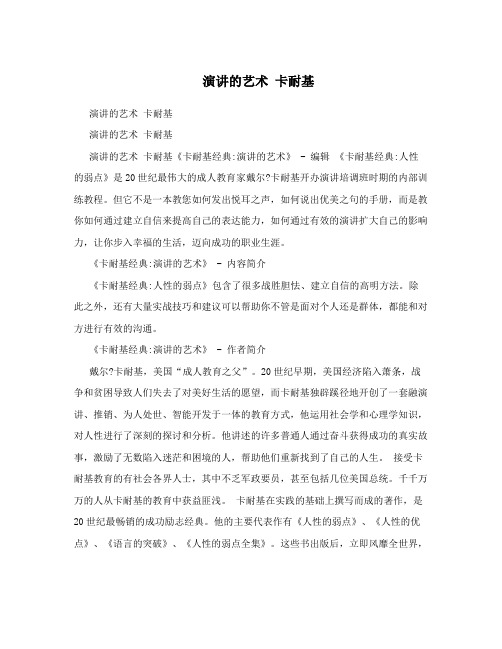
演讲的艺术卡耐基演讲的艺术卡耐基演讲的艺术卡耐基演讲的艺术卡耐基《卡耐基经典:演讲的艺术》 - 编辑《卡耐基经典:人性的弱点》是20世纪最伟大的成人教育家戴尔?卡耐基开办演讲培调班时期的内部训练教程。
但它不是一本教您如何发出悦耳之声,如何说出优美之句的手册,而是教你如何通过建立自信来提高自己的表达能力,如何通过有效的演讲扩大自己的影响力,让你步入幸福的生活,迈向成功的职业生涯。
《卡耐基经典:演讲的艺术》 - 内容简介《卡耐基经典:人性的弱点》包含了很多战胜胆怯、建立自信的高明方法。
除此之外,还有大量实战技巧和建议可以帮助你不管是面对个人还是群体,都能和对方进行有效的沟通。
《卡耐基经典:演讲的艺术》 - 作者简介戴尔?卡耐基,美国“成人教育之父”。
20世纪早期,美国经济陷入萧条,战争和贫困导致人们失去了对美好生活的愿望,而卡耐基独辟蹊径地开创了一套融演讲、推销、为人处世、智能开发于一体的教育方式,他运用社会学和心理学知识,对人性进行了深刻的探讨和分析。
他讲述的许多普通人通过奋斗获得成功的真实故事,激励了无数陷入迷茫和困境的人,帮助他们重新找到了自己的人生。
接受卡耐基教育的有社会各界人士,其中不乏军政要员,甚至包括几位美国总统。
千千万万的人从卡耐基的教育中获益匪浅。
卡耐基在实践的基础上撰写而成的著作,是20世纪最畅销的成功励志经典。
他的主要代表作有《人性的弱点》、《人性的优点》、《语言的突破》、《人性的弱点全集》。
这些书出版后,立即风靡全世界,先后被翻译成几十种文字,被誉为“人类出版史上的奇迹”,无数读者由此走上了成功之路。
《卡耐基经典:演讲的艺术》 - 媒体评论成功其实如此简单,只要你遵循卡耐基先生这些简单适用的人际标准,你就能获得成功。
——马克?维克多?汉森卡耐基从上个世纪初就开始讲授他的成人训练课程,开创了美国的成人教育运动。
他的成功哲学与处世技巧对当今时代的年轻人来说,仍是一个永恒的人生课题。
演讲的艺术1

• 完整事例
比简要事例更详细具体
• 假设事例
描绘的是想像或虚构的情节
让你的演讲“活”起来
• 用事例来阐明你的观点 • 用事例来强化观点 • 用事例使你的观点人性化 • 让你的事例生动起来 • 加强训练,强化效果
用事例来阐明你的观点 — 悬索桥
用事例来强化你的想法 — 《拳击:最危险的运动》
用事例使你的观点人性化 — 抽象的概括OR生动的个人实例
适应听众,调整内容
• 演讲前适应
评估听众对你的演讲可能有 什么反应 调整你要说的话,以便更清 晰、合适,有说服力
• 演讲时适应
观察听众的表情、动作和反 馈,随时调整时间与内容
练习
• 分析以下广告的目标受众是什么人,它们是如何
说服受众的?
• 如果人群改变,广告的设计该如何改变?
支持你的观点
要达到的效果
冗长拖沓
演讲的艺术
你们要追求爱,也要切慕属灵的恩赐,其中更要羡慕的, 是 作 先 知 讲 道 。林前 14:1
• 说服型演讲 • 说服的方法 • 小团体演讲
选择话题与设定目标
第一步:念的话题 • 你认为听众最需要听的话题
第二步:确定目标
• 确定总体目标 • 告知或说服 • 确定具体目标 • 用一个完整但简单的肯定句
说明你想通过演讲完成一件 什么样的事情。
具体目标陈述应该
• “38年。”
解释你的数据
• 说明数据来源 • 简化复杂的数据 • 用图解方法说明数据的
变化趋势
证言
• 专家证言
某一领域具有权威的专家的证言
• 同辈的证言
拥有第一手经验的普通人的经历 或洞察中得来的证词
引用与转述
• 简短 • 准确 • 流畅 • 更能打动人
演讲的艺术_写作指导_1

演讲的艺术_写作指导演讲的艺术一、演讲的技巧(一)演讲的本质什么是演讲?演讲是以宣传鼓动为目的,带艺术性的严肃的社会实践活动。
要求演讲者面对听众,以有声语言为主要表达形式,以态势语言为辅助形式,系统、鲜明的阐明自己的观点和主张。
1、演讲不同于朗诵。
(1)演讲与朗诵的范畴不同,演讲属精神实用艺术,侧重于宣传鼓动。
朗诵属表演艺术,侧重于欣赏。
(2)演讲的选题有很强的现实性、时代性。
朗诵的材料有很大的超越性。
(3)演讲讲究激情,其语言有特殊性。
演讲一定要有激情点(高潮)。
朗诵追求意境,其语言属舞台表演语言。
2、演讲不同于一般的报告。
内容上,报告注重政策性、权威性、指导性。
演讲注重典型性、鲜明性;语言上,报告要求朴实,感情表达不要求大起大落,基调平稳。
朗诵必须要有起伏。
(二)演讲的作用1、促进作用:促进历史转变、促进文明建设、促进人材成长。
2、教育作用:既是教育别人,又是自我教育。
3、美感作用:演讲的题材首先是真实的,必须歌颂真善美,要求形式是美的,语言是美的,态势是美的。
要使人产生愉悦,听一次演讲不仅是一次心灵的进化,而且是一次审美观的升华。
二、演讲稿的写作方法演讲稿也叫演说辞,它是在较为隆重的仪式上或某些公众场所发表的讲话文稿,是演讲的依据,具有宣传、鼓动、教育和欣赏等作用,它可以把演讲者的观点、主张与思想感情传达给听众以及读者,使他们信服并在思想感情上产生共鸣。
讲演稿的结构形式是多种多样的,但归纳起来大致有三部分的内容。
一是提出问题,点出讲话的要点,引起听众的注意和兴趣;二是阐述讲演的主旨,分析要说明的问题;三是总束全文,照应开头,或提出希望祝愿,激励鼓舞听众。
写作演讲稿要注意以下三个特点:第一、针对性。
所谓针对性,首先是作者提出的问题是听众所关心的问题,评论和论辨要有雄辩的逻辑力量,要能为听众所接受并心悦诚服,这样,才能起到应有的社会效果;其次是要懂得听众有不同的对象,不同的层次,而“公众场合”也有不同的类型,在学校如升旗仪式、班会、知识竞赛、学生会干部竞聘等场合,写作时要根据不同场合和不同对象,为听众设计不同的演讲内容。
演讲的艺术读后感
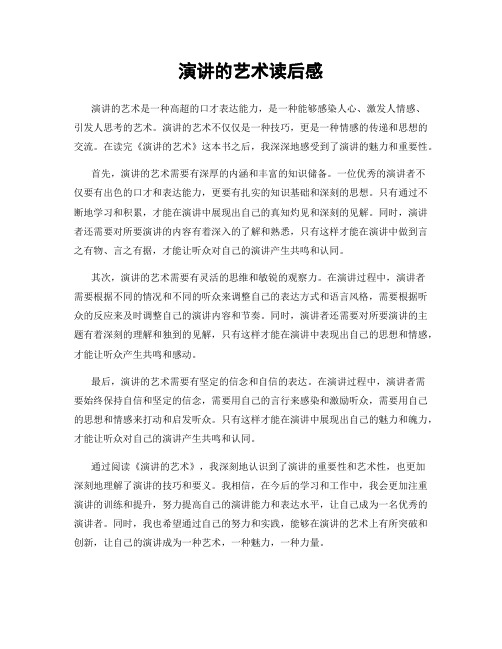
演讲的艺术读后感演讲的艺术是一种高超的口才表达能力,是一种能够感染人心、激发人情感、引发人思考的艺术。
演讲的艺术不仅仅是一种技巧,更是一种情感的传递和思想的交流。
在读完《演讲的艺术》这本书之后,我深深地感受到了演讲的魅力和重要性。
首先,演讲的艺术需要有深厚的内涵和丰富的知识储备。
一位优秀的演讲者不仅要有出色的口才和表达能力,更要有扎实的知识基础和深刻的思想。
只有通过不断地学习和积累,才能在演讲中展现出自己的真知灼见和深刻的见解。
同时,演讲者还需要对所要演讲的内容有着深入的了解和熟悉,只有这样才能在演讲中做到言之有物、言之有据,才能让听众对自己的演讲产生共鸣和认同。
其次,演讲的艺术需要有灵活的思维和敏锐的观察力。
在演讲过程中,演讲者需要根据不同的情况和不同的听众来调整自己的表达方式和语言风格,需要根据听众的反应来及时调整自己的演讲内容和节奏。
同时,演讲者还需要对所要演讲的主题有着深刻的理解和独到的见解,只有这样才能在演讲中表现出自己的思想和情感,才能让听众产生共鸣和感动。
最后,演讲的艺术需要有坚定的信念和自信的表达。
在演讲过程中,演讲者需要始终保持自信和坚定的信念,需要用自己的言行来感染和激励听众,需要用自己的思想和情感来打动和启发听众。
只有这样才能在演讲中展现出自己的魅力和魄力,才能让听众对自己的演讲产生共鸣和认同。
通过阅读《演讲的艺术》,我深刻地认识到了演讲的重要性和艺术性,也更加深刻地理解了演讲的技巧和要义。
我相信,在今后的学习和工作中,我会更加注重演讲的训练和提升,努力提高自己的演讲能力和表达水平,让自己成为一名优秀的演讲者。
同时,我也希望通过自己的努力和实践,能够在演讲的艺术上有所突破和创新,让自己的演讲成为一种艺术,一种魅力,一种力量。
演讲艺术(3篇)
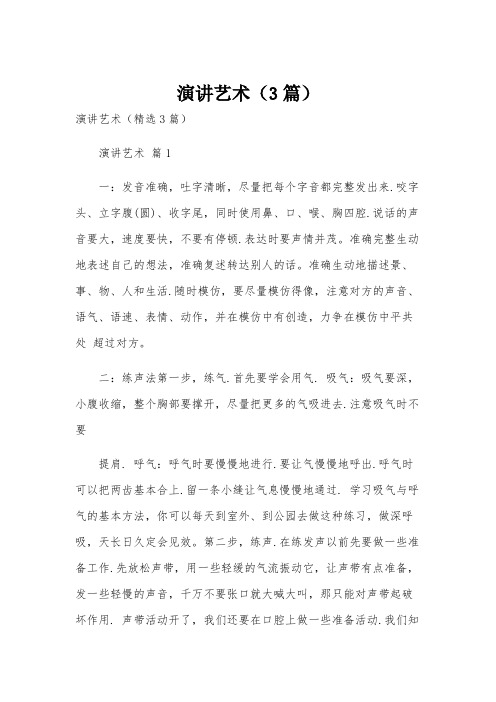
演讲艺术(3篇)演讲艺术(精选3篇)演讲艺术篇1一:发音准确,吐字清晰,尽量把每个字音都完整发出来.咬字头、立字腹(圆)、收字尾,同时使用鼻、口、喉、胸四腔.说话的声音要大,速度要快,不要有停顿.表达时要声情并茂。
准确完整生动地表述自己的想法,准确复述转达别人的话。
准确生动地描述景、事、物、人和生活.随时模仿,要尽量模仿得像,注意对方的声音、语气、语速、表情、动作,并在模仿中有创造,力争在模仿中平共处超过对方。
二:练声法第一步,练气.首先要学会用气. 吸气:吸气要深,小腹收缩,整个胸部要撑开,尽量把更多的气吸进去.注意吸气时不要提肩. 呼气:呼气时要慢慢地进行.要让气慢慢地呼出.呼气时可以把两齿基本合上.留一条小缝让气息慢慢地通过. 学习吸气与呼气的基本方法,你可以每天到室外、到公园去做这种练习,做深呼吸,天长日久定会见效。
第二步,练声.在练发声以前先要做一些准备工作.先放松声带,用一些轻缓的气流振动它,让声带有点准备,发一些轻慢的声音,千万不要张口就大喊大叫,那只能对声带起破坏作用. 声带活动开了,我们还要在口腔上做一些准备活动.我们知道口腔是人的一个重要的共鸣器,声音的洪亮、圆润与否与口腔有着直接的联系,所以不要小看了口腔的作用。
三:速读法:这种训练方法的目的,是在于锻炼人口齿伶俐,语音准确,吐字清晰。
开始朗读的时候速度较慢,逐次加快,一次比一次读得快,最后达到你所能达到的最快速度.读的过程中不要有停顿,发音要准确,吐字要清晰,要尽量果把每个字音都完整的发出来。
可以用录音机把你的速读录下来,然后自己听一听,从中找出不足,进行改进。
四:背诵法目的有两个:一是培养记忆能力,二是培养口头表达能力。
记忆是练口才必不可少的一种素质.诵也就是我们常说的朗诵.它要求在准确把握文章内容的基础上进行声情并茂的表达。
背诵法的着眼点在准上.也就是你背的演讲辞或文章一定要准确,不能有遗漏或错误的地方,而且在吐字、发音上也一定要准确无误。
演讲的艺术-粤教版必修1教案

演讲的艺术-粤教版必修1教案一、教学目标1.了解演讲的定义、类型及基本要素。
2.掌握演讲的基本技巧。
3.能够为特定目的进行演讲。
4.提高学生的口头表达及沟通能力。
二、教学重点和难点1.教学重点:演讲技巧的讲解及实践。
2.教学难点:如何提高学生的口头表达和沟通能力。
三、教学内容3.1 概念解释1.什么是演讲?–演讲是指演说人以语言为工具,在一定环境和目的下,通过论证、议论和感染,达到改变或巩固听众对某个问题的看法和态度的一种活动。
2.演讲的类型–演讲可以分为政治演讲、商务演讲、学术演讲、庆典演讲、竞赛演讲等多种类型。
3.2 演讲的基本要素1.主题:演讲的核心,是演讲人要解决的问题或呈现的事实、情况。
2.论据:演讲人为支持主题所提出的事实、证据、论点,是演讲的“立意”。
3.结论:演讲人对主题所提出的总结,是演讲的“收尾”。
4.语言:演讲时使用的语言要精练、有力、生动,具有感染力和说服力。
3.3 演讲技巧1.发音、语调、语速的掌控:流畅、准确的发音、合理的语调和恰当的语速是演讲的基本要求。
2.姿态、目光、手势的运用:自然、舒展的姿态、自信的目光和鲜明的手势能够提升演讲的效果和说服力。
3.内容、结构、清晰度的保证:演讲内容要丰富、有条理、清晰易懂,让听众容易接受和理解。
3.4 模拟演讲1.学生自选或老师布置一个演讲主题,学生要准备演讲稿并进行模拟演讲。
2.其他同学对演讲稿及演讲表现进行评价,老师提出指导意见。
3.重点讲解和实践技巧。
四、教学方法1.讲授与演示相结合的方式。
2.提问与讨论交互式教学。
五、教学评估1.分组讨论:抽取几个不同的演讲主题,分组进行讨论,讨论内容与主题相关,时间限制一定。
2.模拟演讲:学生分别进行模拟演讲,老师和其他同学进行评价及指导。
3.作业:根据老师布置的一个演讲主题,要求学生准备好演讲稿并进行演讲。
六、教学资料1.《演讲的艺术》(第七版)著者:丘维声2.演讲技巧视频教程。
七、教学总结通过此次教学,学生了解了演讲的基本概念、类型和基本要素,掌握了演讲技巧和实践,能够为特定目的进行演讲,提高了学生的口头表达及沟通能力。
《演讲的艺术》chapter1-5课后summary
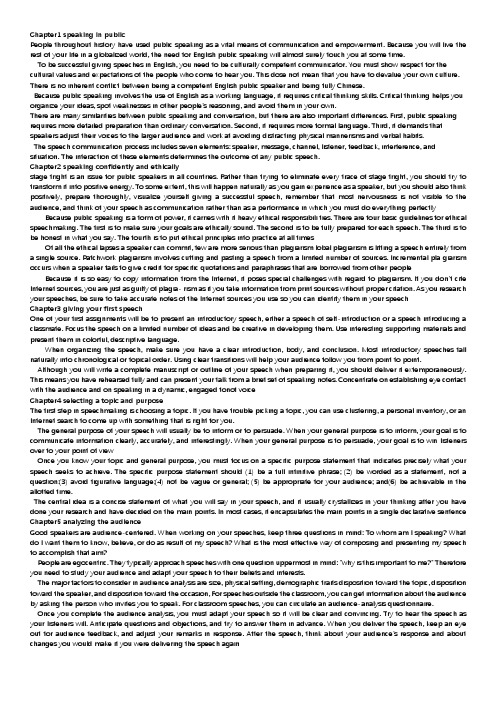
Although you will write a complete manuscript or outline of your speech when preparing it, you should deliver it extemporaneously. This means you have rehearsed fully and can present your talk from a brief set of speaking notes. Concentrate on establishing eye contact with the audience and on speaking in a dynamic, engaged tonof voice
The general purpose of your speech will usually be to inform or to persuade. When your general purpose is to inform, your goal is to communicate information clearly, accurately, and interestingly. When your general purpose is to persuade, your goal is to win listeners over to your point of view
演讲的艺术读后感
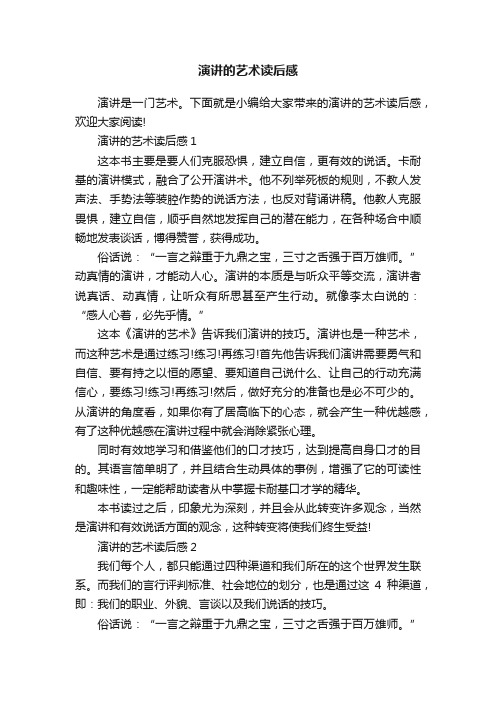
演讲的艺术读后感演讲是一门艺术。
下面就是小编给大家带来的演讲的艺术读后感,欢迎大家阅读!演讲的艺术读后感1这本书主要是要人们克服恐惧,建立自信,更有效的说话。
卡耐基的演讲模式,融合了公开演讲术。
他不列举死板的规则,不教人发声法、手势法等装腔作势的说话方法,也反对背诵讲稿。
他教人克服畏惧,建立自信,顺乎自然地发挥自己的潜在能力,在各种场合中顺畅地发表谈话,博得赞誉,获得成功。
俗话说:“一言之辩重于九鼎之宝,三寸之舌强于百万雄师。
”动真情的演讲,才能动人心。
演讲的本质是与听众平等交流,演讲者说真话、动真情,让听众有所思甚至产生行动。
就像李太白说的:“感人心着,必先乎情。
”这本《演讲的艺术》告诉我们演讲的技巧。
演讲也是一种艺术,而这种艺术是通过练习!练习!再练习!首先他告诉我们演讲需要勇气和自信、要有持之以恒的愿望、要知道自己说什么、让自己的行动充满信心,要练习!练习!再练习!然后,做好充分的准备也是必不可少的。
从演讲的角度看,如果你有了居高临下的心态,就会产生一种优越感,有了这种优越感在演讲过程中就会消除紧张心理。
同时有效地学习和借鉴他们的口才技巧,达到提高自身口才的目的。
其语言简单明了,并且结合生动具体的事例,增强了它的可读性和趣味性,一定能帮助读者从中掌握卡耐基口才学的精华。
本书读过之后,印象尤为深刻,并且会从此转变许多观念,当然是演讲和有效说话方面的观念,这种转变将使我们终生受益!演讲的艺术读后感2我们每个人,都只能通过四种渠道和我们所在的这个世界发生联系。
而我们的言行评判标准、社会地位的划分,也是通过这4种渠道,即:我们的职业、外貌、言谈以及我们说话的技巧。
俗话说:“一言之辩重于九鼎之宝,三寸之舌强于百万雄师。
”动真情的演讲,才能动人心。
演讲的本质是与听众平等交流,演讲者说真话、动真情,让听众有所思甚至产生行动。
就像李太白说的:“感人心着,必先乎情。
”卡耐基的这本《演讲的艺术》告诉我们演讲的技巧。
演讲的艺术 书

演讲的艺术书
《演讲的艺术》是一本关于演讲技巧和方法的书籍,作者是美国著名演讲家戴尔·卡耐基(Dale Carnegie)。
这本书的字数超过了 400 字,具体的字数可能因为不同的版本和排版而有所差异。
在《演讲的艺术》一书中,戴尔·卡耐基分享了他多年来在演讲领域的经验和研究成果。
他通过实际案例、生动的故事和实用的技巧,向读者传授了如何成为一名出色的演讲者。
这本书涵盖了演讲的各个方面,包括演讲的准备、结构、内容组织、语言表达、肢体语言、声音控制等。
卡耐基强调了与听众建立连接的重要性,以及如何通过情感共鸣和有效的沟通来吸引和影响听众。
此外,书中还提供了一些实用的建议和练习,帮助读者提高演讲的自信、清晰度和说服力。
卡耐基鼓励读者不断练习和反思,以不断提升自己的演讲能力。
《演讲的艺术》不仅适用于那些希望在公共场合发表演讲的人,也对日常生活中的沟通和表达有所帮助。
它被广泛认为是一本经典的演讲指南,至今仍然对许多人产生着积极的影响。
如果你对提升自己的演讲能力和沟通技巧感兴趣,我强烈推荐你阅读《演讲的艺术》这本书。
通过学习和应用书中的原则和技巧,你将能够更好地传达自己的思想,与他人建立更紧密的联系,并在各种场合中展现出自信和专业。
(完整版)《演讲的艺术》chapter1-5课后summary
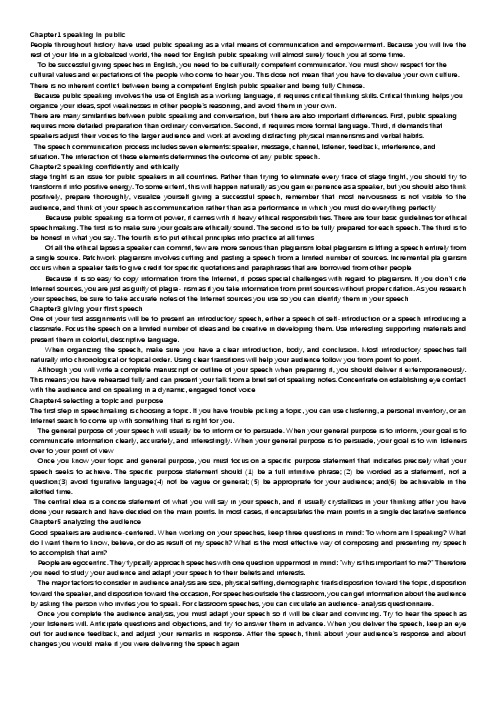
Chapter1 speaking in publicPeople throughout history have used public speaking as a vital means of communication and empowerment. Because you will live the rest of your life in a globalized world, the need for English public speaking will almost surely touch you at some time.To be successful giving speeches in English, you need to be culturally competent communicator. You must show respect for the cultural values and expectations of the people who come to hear you. This dose not mean that you have to devalue your own culture. There is no inherent conflict between being a competent English public speaker and being fully Chinese.Because public speaking involves the use of English as a working language, it requires critical thinking skills. Critical thinking helps you organize your ideas, spot weaknesses in other people’s reasoning, and avoid them in your own.There are many similarities between public speaking and conversation, but there are also important differences. First, public speaking requires more detailed preparation than ordinary conversation. Second, it requires more formal language. Third, it demands that speakers adjust their voices to the larger audience and work at avoiding distracting physical mannerisms and verbal habits.The speech communication process includes seven elements: speaker, message, channel, listener, feedback, interference, and situation. The interaction of these elements determines the outcome of any public speech.Chapter2 speaking confidently and ethicallystage fright is an issue for public speakers in all countries. Rather than trying to eliminate every trace of stage fright, you should try to transform it into positive energy. To some extent, this will happen naturally as you gain experience as a speaker, but you should also think positively, prepare thoroughly, visualize yourself giving a successful speech, remember that most nervousness is not visible to the audience, and think of your speech as communication rather than as a performance in which you must do everything perfectly Because public speaking is a form of power, it carries with it heavy ethical responsibili ties. There are four basic guidelines for ethical speechmaking. The first is to make sure your goals are ethically sound. The second is to be fully prepared for each speech. The third is to be honest in what you say. The fourth is to put ethical principles into practice at all timesOf all the ethical lapses a speaker can commit, few are more serious than plagiarism lobal plagiarism is lifting a speech entirely from a single source. Patchwork plagiarism involves cutting and pasting a speech from a limited number of sources. Incremental pla giarism occurs when a speaker fails to give credit for specific quotations and paraphrases that are borrowed from other people Because it is so easy to copy information from the Internet, it poses special challenges with regard to plagiarism. If you don't cite Internet sources, you are just as guilty of plagia- rism as if you take information from print sources without proper citation. As you research your speeches, be sure to take accurate notes of the Internet sources you use so you can identify them in your speechChapter3 giving your first speechOne of your first assignments will be to present an introductory speech, either a speech of self-introduction or a speech introducing a classmate. Focus the speech on a limited number of ideas and be creative in developing them. Use interesting supporting materials and present them in colorful, descriptive language.When organizing the speech, make sure you have a clear introduction, body, and conclusion. Most introductory speeches fall naturally into chronological or topical order. Using clear transitions will help your audience follow you from point to point.Although you will write a complete manuscript or outline of your speech when preparing it, you should deliver it extemporaneously. This means you have rehearsed fully and can present your talk from a brief set of speaking notes. Concentrate on establishing eye contact with the audience and on speaking in a dynamic, engaged tonof voiceChapter4 selecting a topic and purposeThe first step in speechmaking is choosing a topic. If you have trouble picking a topic, you can use clustering, a personal inventory, or an Internet search to come up with something that is right for you.The general purpose of your speech will usually be to inform or to persuade. When your general purpose is to inform, your goal is to communicate information clearly, accurately, and interestingly. When your general purpose is to persuade, your goal is to win listeners over to your point of viewOnce you know your topic and general purpose, you must focus on a specific purpose statement that indicates precisely what your speech seeks to achieve. The specific purpose statement should (1) be a full infinitive phrase; (2) be worded as a statement, not a question:(3) avoid figurative language;(4) not be vague or general; (5) be appropriate for your audience; and(6) be achievable in the allotted time.The central idea is a concise statement of what you will say in your speech, and it usually crystallizes in your thinking after you have done your research and have decided on the main points. In most cases, it encapsulates the main points in a single declarative sentence Chapter5 analyzing the audienceGood speakers are audience-centered. When working on your speeches, keep three questions in mind: To whom am I speaking? What do I want them to know, believe, or do as result of my speech? What is the most effective way of composing and presenting my speech to accomplish that aim?People are egocentric. They typically approach speeches with one question uppermost in mind: "why is this important to me?" Therefore you need to study your audience and adapt your speech to their beliefs and interests.The major factors to consider in audience analysis are size, physical setting, demographic traits disposition toward the topic, disposition toward the speaker, and disposition toward the occasion, For speeches outside the classroom, you can get information about the audience by asking the person who invites you to speak. For classroom speeches, you can circulate an audience-analysis questionnaire.Once you complete the audience analysis, you must adapt your speech so it will be clear and convincing. Try to hear the speech as your listeners will. Anticipate questions and objections, and try to answer them in advance. When you deliver the speech, keep an eye out for audience feedback, and adjust your remarks in response. After the speech, think about your audience's response and about changes you would make if you were delivering the speech again。
演讲的艺术_第一章 战胜恐惧、战胜自我
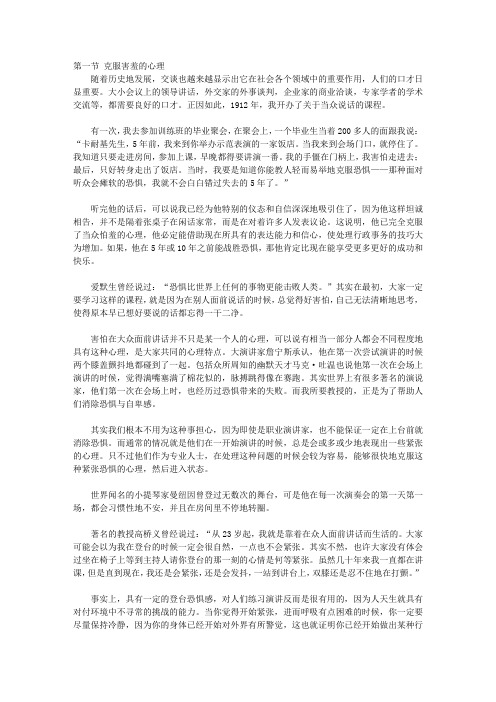
第一节克服害羞的心理随着历史地发展,交谈也越来越显示出它在社会各个领域中的重要作用,人们的口才日显重要。
大小会议上的领导讲话,外交家的外事谈判,企业家的商业洽谈,专家学者的学术交流等,都需要良好的口才。
正因如此,1912年,我开办了关于当众说话的课程。
有一次,我去参加训练班的毕业聚会,在聚会上,一个毕业生当着200多人的面跟我说:“卡耐基先生,5年前,我来到你举办示范表演的一家饭店。
当我来到会场门口,就停住了。
我知道只要走进房间,参加上课,早晚都得要讲演一番。
我的手僵在门柄上,我害怕走进去;最后,只好转身走出了饭店。
当时,我要是知道你能教人轻而易举地克服恐惧——那种面对听众会瘫软的恐惧,我就不会白白错过失去的5年了。
”听完他的话后,可以说我已经为他特别的仪态和自信深深地吸引住了,因为他这样坦诚相告,并不是隔着张桌子在闲话家常,而是在对着许多人发表议论。
这说明,他已完全克服了当众怕羞的心理,他必定能借助现在所具有的表达能力和信心,使处理行政事务的技巧大为增加。
如果,他在5年或10年之前能战胜恐惧,那他肯定比现在能享受更多更好的成功和快乐。
爱默生曾经说过:“恐惧比世界上任何的事物更能击败人类。
”其实在最初,大家一定要学习这样的课程,就是因为在别人面前说话的时候,总觉得好害怕,自己无法清晰地思考,使得原本早已想好要说的话都忘得一干二净。
害怕在大众面前讲话并不只是某一个人的心理,可以说有相当一部分人都会不同程度地具有这种心理,是大家共同的心理特点。
大演讲家詹宁斯承认,他在第一次尝试演讲的时候两个膝盖颤抖地都碰到了一起。
包括众所周知的幽默天才马克·吐温也说他第一次在会场上演讲的时候,觉得满嘴塞满了棉花似的,脉搏跳得像在赛跑。
其实世界上有很多著名的演说家,他们第一次在会场上时,也经历过恐惧带来的失败。
而我所要教授的,正是为了帮助人们消除恐惧与自卑感。
其实我们根本不用为这种事担心,因为即使是职业演讲家,也不能保证一定在上台前就消除恐惧。
演讲的艺术(1)

四、如何开头与结尾
(一)良好- 的开端是成功的一半 1. 开门见山 2. 交代背景 3. 激发听众思考
四、如何开头与结尾
(二)结尾- 要有力
1. 结语的作用 归纳概括、鼓励行动或者唤起情感
2. 结尾的方法 归纳式结尾、点睛式结尾 畅想式结尾、延伸式结尾
3、一只手,手心向上——上区 ☼ 一眨眼的功夫,他就爬到了树顶。 ☼ 攀登吧!无限风光在险峰。
三、如何有效地登台演讲
(五)注意- 态度 1. 喜欢产生喜欢 2. 自信使听众产生信心 3. 热情洋溢使听众兴致勃勃
三、如何有效地登台演讲
(六)注意- 语气 1. 机械背诵讲稿的效果 2. 和好友聊天的场景 3. 林肯强调要点的方法
三、如何有效地登台演讲
(二)注意- 给人的印象
1. 演讲者的仪表 2. 演讲者的内在精神风貌 3. 演讲者的穿着舒适、得体
不穿以前没有穿过的衣服 也不能过于华美
三、如何有效地登台演讲
(三)注意眼神 - 1. 眼睛要与观众交流 2. 不要长时间专注于一个人 3. 不能像探照灯一样扫来扫去 4. 适时地把目光放在不同的角落
(五)注意- 修辞
1. 幽默的种类 表情幽默、动作幽默和语言幽默
2. 产生幽默的修辞 比喻、对比、双关、婉曲、借题
二、如何准备专题演讲
(五)认真- 练讲
1. 练习的内容 走上讲台、 呼吸、目光、面部表情 手势
2. 练习的方法 利用录音机、摄像机 “益智游戏 ”:站着思考
三、如何效地登台演讲
(一)充满- 信心 1. 充分准备、看清自己的优势 2. 想象比赛的场景 3. 恐惧时回避观众目光
三、如何有效地登台演讲
(四)注意- 手势动作 1. 手势可以体现演讲者的情绪 2. 手势语的运用
《演讲的艺术:如何在舞台上展现最好的自我》
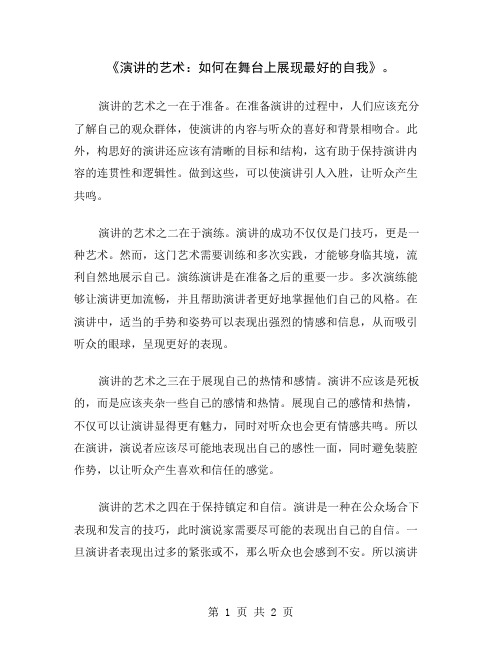
《演讲的艺术:如何在舞台上展现最好的自我》。
演讲的艺术之一在于准备。
在准备演讲的过程中,人们应该充分了解自己的观众群体,使演讲的内容与听众的喜好和背景相吻合。
此外,构思好的演讲还应该有清晰的目标和结构,这有助于保持演讲内容的连贯性和逻辑性。
做到这些,可以使演讲引人入胜,让听众产生共鸣。
演讲的艺术之二在于演练。
演讲的成功不仅仅是门技巧,更是一种艺术。
然而,这门艺术需要训练和多次实践,才能够身临其境,流利自然地展示自己。
演练演讲是在准备之后的重要一步。
多次演练能够让演讲更加流畅,并且帮助演讲者更好地掌握他们自己的风格。
在演讲中,适当的手势和姿势可以表现出强烈的情感和信息,从而吸引听众的眼球,呈现更好的表现。
演讲的艺术之三在于展现自己的热情和感情。
演讲不应该是死板的,而是应该夹杂一些自己的感情和热情。
展现自己的感情和热情,不仅可以让演讲显得更有魅力,同时对听众也会更有情感共鸣。
所以在演讲,演说者应该尽可能地表现出自己的感性一面,同时避免装腔作势,以让听众产生喜欢和信任的感觉。
演讲的艺术之四在于保持镇定和自信。
演讲是一种在公众场合下表现和发言的技巧,此时演说家需要尽可能的表现出自己的自信。
一旦演讲者表现出过多的紧张或不,那么听众也会感到不安。
所以演讲人要做到内心镇定,满怀自信与思考,即使出现小失误也不要气馁,销声匿迹。
注意这一点可以让人们实现更高的成功。
演讲的艺术之五在于展示自己的个人特质。
演讲并非是一种般的表格化演讲,而是应该包含自己的个人特质。
在公共演讲中,每个人都有自己独特的人格和风格。
这种个性需要在演讲中显示。
换句话说,一个演讲者需要展示出自己的独特气质以吸引听众,这样可以使演讲更加生动和吸引人。
总之,演讲的艺术是多方面的,包括准备,演练,展示热情和感情,保持镇定和自信,展示自己的个人特质。
这些都是一个好演讲所需要的基本要素,只有掌握并融会贯通,才能使演讲在舞台展现最好的自我。
演讲的艺术需要不断地学习和提高。
《演讲的艺术》核心内容
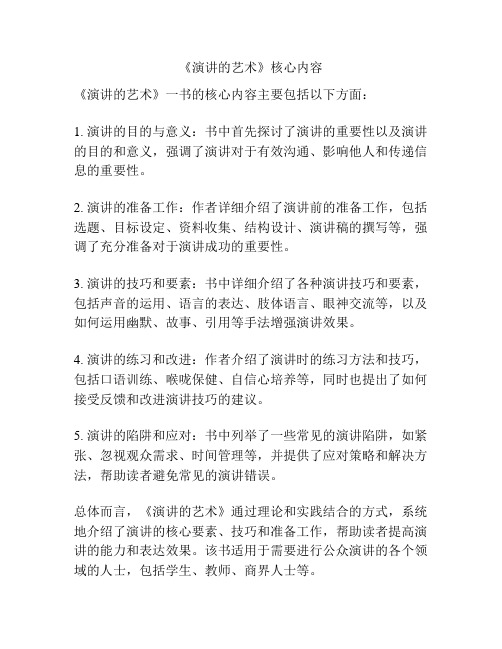
《演讲的艺术》核心内容
《演讲的艺术》一书的核心内容主要包括以下方面:
1. 演讲的目的与意义:书中首先探讨了演讲的重要性以及演讲的目的和意义,强调了演讲对于有效沟通、影响他人和传递信息的重要性。
2. 演讲的准备工作:作者详细介绍了演讲前的准备工作,包括选题、目标设定、资料收集、结构设计、演讲稿的撰写等,强调了充分准备对于演讲成功的重要性。
3. 演讲的技巧和要素:书中详细介绍了各种演讲技巧和要素,包括声音的运用、语言的表达、肢体语言、眼神交流等,以及如何运用幽默、故事、引用等手法增强演讲效果。
4. 演讲的练习和改进:作者介绍了演讲时的练习方法和技巧,包括口语训练、喉咙保健、自信心培养等,同时也提出了如何接受反馈和改进演讲技巧的建议。
5. 演讲的陷阱和应对:书中列举了一些常见的演讲陷阱,如紧张、忽视观众需求、时间管理等,并提供了应对策略和解决方法,帮助读者避免常见的演讲错误。
总体而言,《演讲的艺术》通过理论和实践结合的方式,系统地介绍了演讲的核心要素、技巧和准备工作,帮助读者提高演讲的能力和表达效果。
该书适用于需要进行公众演讲的各个领域的人士,包括学生、教师、商界人士等。
《演讲的艺术1》
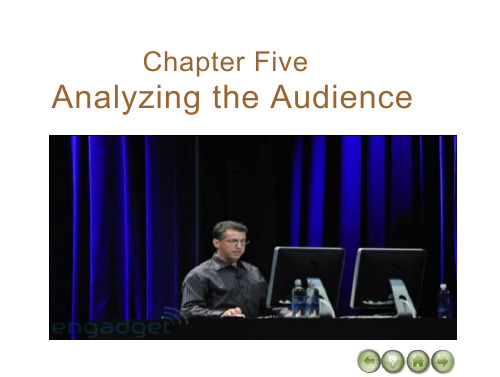
important in determining how you handle the mater iiaall..
3. Factors in Audience Analysis
Hale Waihona Puke 3. Factors in Audience Analysis
Disposition Toward the topic
(1) Interest
—people don ’t usually expend the time and effort to
attend a speech unless they have some interested in the topic .
audience , you can adjust your speech to address their concerns or to answer their objections aga inst your point of view .
Disposition Toward the Speaker :
Size :
—No matter what size group you are addressing , bear in mind one basic
principle : The larger the audience , the more formal your presentation must be .
steps to get your classmates involved , e . g . by an arresting intro duct
演讲的艺术(第十三版)(中国版)教师用书Chapter_1_Speaking_in_Public
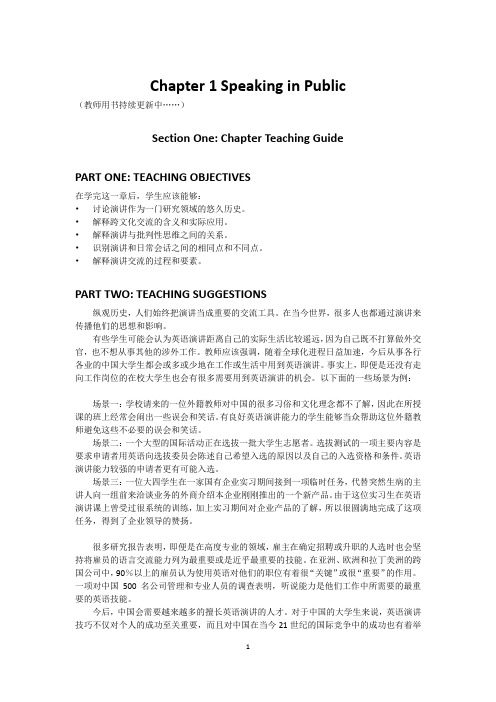
Chapter 1 Speaking in Public(教师用书持续更新中……)Section One: Chapter Teaching GuidePART ONE: TEACHING OBJECTIVES在学完这一章后,学生应该能够:•讨论演讲作为一门研究领域的悠久历史。
•解释跨文化交流的含义和实际应用。
•解释演讲与批判性思维之间的关系。
•识别演讲和日常会话之间的相同点和不同点。
•解释演讲交流的过程和要素。
PART TWO: TEACHING SUGGESTIONS纵观历史,人们始终把演讲当成重要的交流工具。
在当今世界,很多人也都通过演讲来传播他们的思想和影响。
有些学生可能会认为英语演讲距离自己的实际生活比较遥远,因为自己既不打算做外交官,也不想从事其他的涉外工作。
教师应该强调,随着全球化进程日益加速,今后从事各行各业的中国大学生都会或多或少地在工作或生活中用到英语演讲。
事实上,即便是还没有走向工作岗位的在校大学生也会有很多需要用到英语演讲的机会。
以下面的一些场景为例:场景一:学校请来的一位外籍教师对中国的很多习俗和文化理念都不了解,因此在所授课的班上经常会闹出一些误会和笑话。
有良好英语演讲能力的学生能够当众帮助这位外籍教师避免这些不必要的误会和笑话。
场景二:一个大型的国际活动正在选拔一批大学生志愿者。
选拔测试的一项主要内容是要求申请者用英语向选拔委员会陈述自己希望入选的原因以及自己的入选资格和条件。
英语演讲能力较强的申请者更有可能入选。
场景三:一位大四学生在一家国有企业实习期间接到一项临时任务,代替突然生病的主讲人向一组前来洽谈业务的外商介绍本企业刚刚推出的一个新产品。
由于这位实习生在英语演讲课上曾受过很系统的训练,加上实习期间对企业产品的了解,所以很圆满地完成了这项任务,得到了企业领导的赞扬。
很多研究报告表明,即便是在高度专业的领域,雇主在确定招聘或升职的人选时也会坚持将雇员的语言交流能力列为最重要或是近乎最重要的技能。
- 1、下载文档前请自行甄别文档内容的完整性,平台不提供额外的编辑、内容补充、找答案等附加服务。
- 2、"仅部分预览"的文档,不可在线预览部分如存在完整性等问题,可反馈申请退款(可完整预览的文档不适用该条件!)。
- 3、如文档侵犯您的权益,请联系客服反馈,我们会尽快为您处理(人工客服工作时间:9:00-18:30)。
3. Factors in Audience Analysis
3. Factors in Audience Analysis
Physical Setting:
—When you are invited to speak, don’t be shy about asking questions of the person who arranged the speech. If possible, look over the room a few days in advance, or else arrive early on the day of your speech to inspect the room. —When faced with an audience that is potentially hot, sleepy, and cross, do your best to make the speech as interesting and lively as you can. —Don’t let yourself be influenced by the poor physical setting.
—The more competent the listener believe a speaker to be, the more likely they are to accept what the speaker says. —The more listeners believe that a speaker has their best interests at heart, the more likely they are to respond positively to the speaker’s message.
2. The Psychology of Audiences
What these psychological principles mean to you as a speaker: —You need some grasp of what your listeners know, believe, and care about. —You should learn enough about your audience to know what you should do to make your ideas clear and meaningful.
Physical Setting:
—The receptivity of listeners to your speech frequently will be influenced by factors beyond their control—and sometimes beyond your control. —When you face any speaking situation, it is important to know in advance if there will be any difficulties with physical setting.
audience, you can adjust your speech to address their concerns or to answer their objections against your point of view.
Disposition Toward the Speaker :
3. Factors in Audience Analysis
Definition: Anything characteristic of a given audience is potentially
important to a speaker addressing that audience. In most cases, however, your audience analysis will proceed in light of six broad categories : size, physical setting, disposition toward the topic, the speaker, and the occasion.
Chapter Five
Analyzing Analyzing the Audience
1. Audience-Centeredness
Good public speakers are audience-centered. They know the primary purpose of speechmaking is to gain a desired response from listeners. Being audience-centered does not involve taking any means to and end. You should not compromise your beliefs to get a favorable response from the audience. Nor should you use devious, unethical tactics to achieve your goal. You can remain true to yourself and speak ethically while adapting your message to the needs of a particular audience. To be audience-centered, you should keep several questions in mind audiencewhen you prepare your speeches: To whom am I speaking? What do I want them to know, believe, or do as a result of my speech? What is the most effective way of composing and presenting my speech to accomplish that aim?
2. The Psychology of Audiences
People may be compelled to attend a speech, but no one can make them listen unless they want to. It’s up to the speaker to make the audience do pay attention, they don’t choose to pay attention. Even when people do pay attention, they don’t process a speaker’s message exactly as the speaker intends. Auditory perception is always selective. Every speech contains two messages—the one sent by the speaker and the one received by the listener. What a speaker says is filtered through a listener’s frame of reference. People hear what they want to hear. People are egocentric. Very simply people usually want to hear about things that are meaningful to them. What these psychological principles mean to you as a speaker: —your listeners will hear and judge what you say on the basis of what they already know and believe. —you must relate your message to your listeners—show how it pertains to them, explain why they should care about it as much as you do.
(3) attitude —The attitude of you listeners toward your topic can be extremely important in determining how you handle the material.
3. Situational Audience Analysis 4. Factors in Audience Analysis
—You should assess the interest of your audience in advance and to
adjust your speech accordingly. —If your topic is not like to generate great interest, you must take special steps to get your classmates involved, e.g. by an arresting introduction, Provocative supporting materials, vivid language, dynamic delivery, and so forth.
3. Factors in Audience Analysis
Disposition Toward the topic
(1) Interest
—people don’t usually expend the time and effort to
